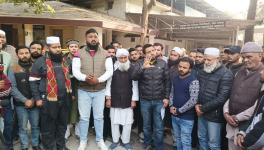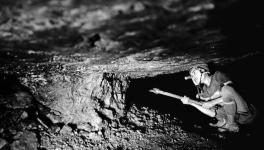Samjhauta Express Case: Special Court Lambasts NIA for ‘Gaping Holes’ in Prosecution

Image Courtesy: India Today
A Panchkula Special Court that acquitted all the accused in the 2007 Samjhauta Express blast case, where 68 people were killed, came down heavily on the National Investigation Agency, saying there were “gaping holes” in the prosecution’s case.
All the four accused- including prime accused former Rashtriya Swayamsevak Sangh (RSS) member Swami Aseemanand, Lokesh Sharma, Kamal Chauhan and Rajinder Chaudhary, were acquitted by the court on March 20. On Thursday March 28, the 160-page judgement in the case was made public.
Special Court judge Jagdeep Singh said that the court had to “conclude this judgment with deep pain and anguish as a dastardly act of violence remained unpunished for want of credible and admissible evidence.”
The court pulled up the investigating agencies for coining terms like “Muslim terrorism, Hindu fundamentalism etc. or brand an act of criminal(s) as act(s) of particular religion, caste or community.” Several witnesses turned hostile. As per a report in The Tribune, the agency had described the 2007 Samjhauta blasts as a revenge of jihadi attacks on Hindu temples in its chargesheet against the accused.
Also Read: Samjhauta Express Blasts Case: Acquitted For Want of Evidence
“Gaping holes” in the Case
NIA’s heavy reliance on the retracted confession of accused Naba Kumar Sarkar alias Swami Aseemanand and disclosure statements of other accused to establish their guilt was a major reason behind the falling apart of the 2007 Samjhauta Express blasts case.
“There are gaping holes in the prosecution evidence and an act of terrorism has remained unsolved. Terrorism has no religion because no religion in the world preaches violence. A Court of Law is not supposed to proceed on popular or predominant public perception or the political discourse of the day and ultimately it has to appreciate the evidence on record,” the court said. The order of special court judge Jagdeep Singh said the investigative agency also depended on circumstantial evidence, but could not bring on record concrete oral, documentary or scientific evidence to connect the accused with the crime in question.
It added there was not an “iota of evidence” to make out any motive on the part of the accused to indulge in the crime. The judge also said that as per the prosecution’s case, the covers of suitcases with the unexploded improvised bombs were bought from Kothari market in Indore, and found to have been stitched by a tailor there. However, “very strangely,” the agency did not get an identification parade of suspects conducted to establish this.
“Thus the investigating agency has lost a very valuable piece of evidence by not conducting investigation properly in this regard,” the judgment said. The judge said the identification parade “might have given some vital clue about real culprits involved in the crime. However, the same has not been done for the reasons best known to the investigation agency.”
‘Slapdash Probe and Inadmissible Evidence’
The Samjhauta case has been a matter of a political slugfest between Congress and the ruling BJP. The latter had accused the then UPA government of politicising the case and falsely coining the term “saffron terror.”
Yet, the court observed that there is no evidence on record to show as to how and from where raw materials for making/preparation of bombs were procured; as to who collected the material to prepare the explosives, who had prepared/assembled the bomb/explosives, how and from where technical know-how was arranged/obtained with regard to preparation of bomb/explosives, who planted the bombs in Samjhauta Express train etc.
Also Read: Injustice Unlimited: Court Verdicts on Aseemanand and Saibaba
The judge also pointed out that the prosecution had examined a witness who said he was on board the Samjhauta Express. According to the witness, the train started from Delhi around 10:50 PM, but after around ten minutes, stopped for some time. The witness further said that somebody was saying that some persons had gotten down from the general coaches, “meaning thereby that some suspects are stated to have de-boarded the train after the start of journey”, according to the judgment.
“However, there is no investigation on this aspect and in fact as per the version put forth by the investigating agency, none of the accused persons travelled in the Samjhauta Express train and the accused had allegedly planted explosives in the train at the platform of the Old Delhi Railway Station and escaped then and there,” the judge said.
He said that the testimony of the witness goes diametrically opposite to such version of the investigating agency.
“Admittedly, the present case is based on circumstantial evidence and it is settled law that all circumstance must form a complete chain in order to rule out innocence of the accused persons or culpability of persons other than the accused,” the judge said.
He said there was no evidence regarding any meeting of minds between the accused to commit the crime. As alleged by the NIA, the accused had loaded explosive-laden suitcases on the Samjhauta train from Old Delhi Railway station, and yet, the NIA did not submit CCTV footage of the said railway station. It also did not produce records of a dormitory where the accused stayed a night before the blasts and neither did it submit the train tickets or bus tickets used by the accused to travel back to their destinations from Delhi. The court also refused to admit Aseemanand’s confessional statement recorded in a Panchkula court in 2011.
“It is settled legal proposition that unless the main features of the story/prosecution version are shown to be true it would be unsafe to rely upon uncorroborated confessional statement, especially when the same is found to be given under circumstances indicating certain degree of influence/duress/pressure,” the court said.
Read More: Too Many Coincidences in the Mecca Masjid Acquittal
Get the latest reports & analysis with people's perspective on Protests, movements & deep analytical videos, discussions of the current affairs in your Telegram app. Subscribe to NewsClick's Telegram channel & get Real-Time updates on stories, as they get published on our website.
























